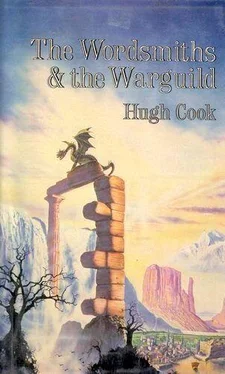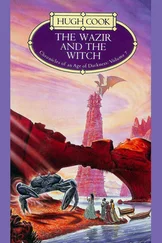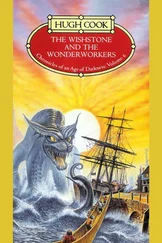Hugh Cook - The Wordsmiths and the Warguild
Здесь есть возможность читать онлайн «Hugh Cook - The Wordsmiths and the Warguild» весь текст электронной книги совершенно бесплатно (целиком полную версию без сокращений). В некоторых случаях можно слушать аудио, скачать через торрент в формате fb2 и присутствует краткое содержание. Жанр: Фэнтези, на английском языке. Описание произведения, (предисловие) а так же отзывы посетителей доступны на портале библиотеки ЛибКат.
- Название:The Wordsmiths and the Warguild
- Автор:
- Жанр:
- Год:неизвестен
- ISBN:нет данных
- Рейтинг книги:4 / 5. Голосов: 1
-
Избранное:Добавить в избранное
- Отзывы:
-
Ваша оценка:
- 80
- 1
- 2
- 3
- 4
- 5
The Wordsmiths and the Warguild: краткое содержание, описание и аннотация
Предлагаем к чтению аннотацию, описание, краткое содержание или предисловие (зависит от того, что написал сам автор книги «The Wordsmiths and the Warguild»). Если вы не нашли необходимую информацию о книге — напишите в комментариях, мы постараемся отыскать её.
The Wordsmiths and the Warguild — читать онлайн бесплатно полную книгу (весь текст) целиком
Ниже представлен текст книги, разбитый по страницам. Система сохранения места последней прочитанной страницы, позволяет с удобством читать онлайн бесплатно книгу «The Wordsmiths and the Warguild», без необходимости каждый раз заново искать на чём Вы остановились. Поставьте закладку, и сможете в любой момент перейти на страницу, на которой закончили чтение.
Интервал:
Закладка:
By the time of the battle of Androlmarphos, the debate had been going on for half a millenium, and, far from being exhausted, was growing steadily more complicated; the matter of the role of the individual in history now involved questions of free will versus predestination, and, most recently, fractious deliberations about the very meaning of the word "history."
Some argued that history is "a sequence of events." Others insisted that it is "events determining culture." But then, in that case – what is culture? (To that supplementary question, at least twenty-seven different answers were proposed – and that was only in a single day's debate.)
One philosopher – Klen Klo, a noted drunkard and kleptomaniac – argued that "History is everything which happens apart from the weather." This satisfied many people for almost as long as half a day, until one of his rivals – Shomo Shamo Shah, a one-time gladiator – refuted Klen Klo's assertion by noting that "Whoever could change the weather would be a world historical figure, therefore the unchanging of the weather is a historical event."
Shomo Shamo Shah, intoxicated by what he liked to think of as his own cleverness, went on to claim that unevents – such as the nonchanging of the weather – are also part of history. In the terms of this definition, any uneventful life which failed to change anything at all could be seen as world historical. The world, said Shomo Shamo Shah, might be full of world historical figures – such as Klen Klo.
Whereupon Klen Klo, also intoxicated – though alcohol was the villain in his case – promptly punched Shomo Shamo Shah in the nose, thereby sparking off a battle between philosophers which was, at least in one of them more mundane and generally accepted meanings of the word, a historical event.
None of this directly affected Togura Poulaan, who was a long, long way from Chi'ash-lan, and who never got to hear of the punch-up between Klen Klo and Shomo Shamo Shah, let alone the debate about the role of the individual in history. Accordingly, questions of what Togura mgith or would or could have thought about the debate must remain strictly theoretical; he did not do much spontaenous philosophical thinking, apart from wondering, not infrequently, "Why am I here?", "What's going on?" and "Why do these things always happen to me?"
Nevertheless, it is possible that Togura might – if given the opportuntiy to participate in the debate in Chi'ash-lan – have made a certain contribution. One cannot imagine it being made with much style, as he was no orator; being young, he would undoubtedly have had to speak through an interpreter. In the manner of the inexperienced, he might have been long-winded as well; however, assuming this fault to have been cured, he might have come up with something like this:
"History is what we understand. The rest is a waking nightmare. History is the explanation of who holds the knife. Withut the explanation, all we understand is the pain."
His remarks, of course, would have left the major questions unanswered, but, unlike some of the frivolities ventured by the philosophers, they would have been heartfelt truths discovered by experience. If challenged to justify his own position, Togura could have easily supported it with material drawn from his own life.
It was at Runcorn that he finally managed to get a reliable account of events which had been, until then, unexplained nightmares. A mild-mannered pirate with designs on his virginity (which, in the end, came to nothing) spent a whole day talking with him in a bar. They were sober the whole time, as, thanks to strict rationing, they had to while away the whole day with a single mug of ale apiece.
Togura learnt that rocks could be wakened to life by a magic artefact known as a death-stone. That explained the walking rock which had chased him through Looming Forest so long ago. As Draven had told him, the troops Togura had met at Lorford, in Estar, had been Collosnon soldiers in the service of the Lord Emperor Khmar of Tameran.
It seemed that the warrior Elkor Alish had defeated Khmar's army of invasion, with, perhaps, a little help from certain wizards. Later, Alish had gone hunting for a death-stone. Finding one, he had made an alliance with a pirate chief, Menator, and had set out to conquer the world. Recruiters had scavenged even to the Lezconcarnau Plains, enlisting mercenaries, which was how Togura and the villagers had, belatedly, come to join Alish's conquering army in the city of Androlmarphos.
Alish had lost a great battle on the plains to the east of Androlmarphos; Togura, fortunately, had been ill with dysentery at the time. Subsequently, the enemy – who had come into possession of the death-stone, stealing it from Alish – had stormed Androlmarphos with the help of animated rocks.
All was much clearer.
With the help of a rough and ready map (drawn on a tabletop with someone else's spilt beer) Togura was even able to make an estimate of the route he had travelled after leaving Estar. He had crossed the Ironband Mountains – he remembered, distinctly, a mad moment when he had claimed those mountains as his empire – and, descending those mountains, had reached the northern part of the Lezconcarnau Plains, there to be captured by a roving band of villagers.
Thanks to that tutorial session in Runcorn (he was offered another kind of tutorial, too, but declined) his nightmare became history.
This, of course, does not answer the original question: does history dictate to the individual or vice versa? Some philosophers – Lunter Hojo, for instance, the notorious lunatic who was almost killed in a kite-crash – hold that "both possibilities are true"; in the case of Togura Poulaan, however, it could be asserted, on the basis of what he had endured until reaching Runcorn, that "both possibilities are untrue."
Togura had been severely buffeted by the turbulence on the fringes of great events, but those events had not created a destiny for him – they had simply kicked him until he was dizzy. And he had never yet been in a position where he could personally influence the world's affairs. Using Togura as an example, it is possible to argue that "some of our lives are random" – though anyone unwilling to become embroiled in the tiresome disputes of Korugatu philosophers would do best to ignore the subject altogether.
Certainly Togura's first chance to put the theory to the test, and to attempt to become a world historical figure – or to be forced, by the thrust of events, to accept that destiny – came at Runcorn. Though there were few people in the city, there were many plans, plots, cabals, schemes and conspiracies. Little hives of intrigue were abuzz with low-voiced diplomacies, threats, promises, oaths of allegiance and wild speculations.
Men were planning to murder their defeated leader, Elkor Alish. Others were hoping to steal the death-stone back from the opposition, and ensure that Elkor Alish did become world conqueror after all. Some were for over-running one of the smaller mountain kingdoms on the coast to the north of Runcorn – the choice was either Chorst or Dybra. A few were for setting up a kingdom in Estar. Many held that, with their depleted numbers, the only sensible thing to do was to retire to the Greater Teeth.
On one hot summer's day, the fair-haired young pirate by the name of Drake made Togura an offer. They had just collected the day's ration of rice and vivda (which was issued together with a single metal token good for a mug of beer in any tavern in town) and were sitting eating when Drake made his proposition.
"I'm going with an embassy to Selzirk," said Drake.
"Selzirk?"
"Don't tell me you don't know where Selzirk is," said Drake. "I'd have thought even you'd know that."
"I do," said Togura, with dignity. "Selzirk's the capital of the Harvest Plains. The capital of the people who defeated us at Androlmarphos. I wouldn't have thought it'd be a healthy place for a pirate to venture just now."
Читать дальшеИнтервал:
Закладка:
Похожие книги на «The Wordsmiths and the Warguild»
Представляем Вашему вниманию похожие книги на «The Wordsmiths and the Warguild» списком для выбора. Мы отобрали схожую по названию и смыслу литературу в надежде предоставить читателям больше вариантов отыскать новые, интересные, ещё непрочитанные произведения.
Обсуждение, отзывы о книге «The Wordsmiths and the Warguild» и просто собственные мнения читателей. Оставьте ваши комментарии, напишите, что Вы думаете о произведении, его смысле или главных героях. Укажите что конкретно понравилось, а что нет, и почему Вы так считаете.












